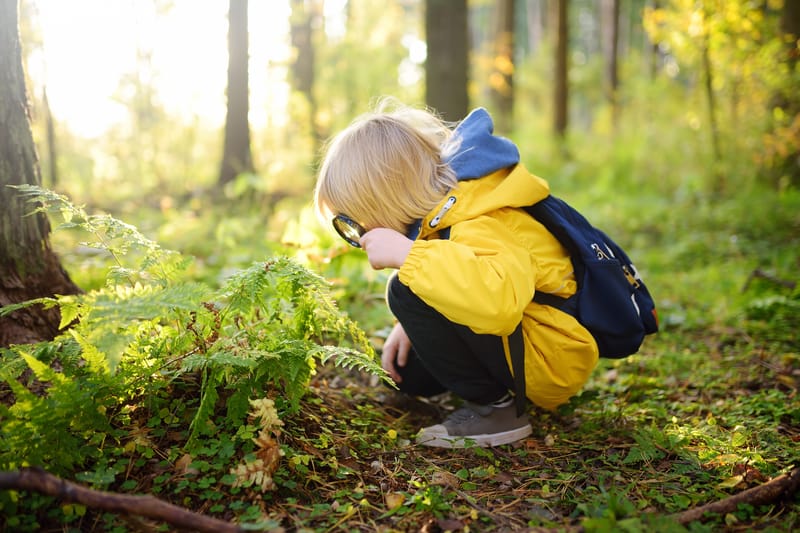What is Forest School?

What is Forest and Nature School?
Forest and Nature School is a research-backed model of education that is rooted in supporting the ways that human beings naturally learn best: outdoors, on uneven terrain, with the land, in social settings, with mentors/facilitators modeling respect and reciprocal relationship with others and with the land, with lots of opportunity for creative thought, exploration, inquiry, learning, and free play.
What are the origins of 'Forest School'?
This way of learning has features in common with many Indigenous cultures' sophisticated systems of education throughout the world, including here.
But 'Forest School' as the pedagogy we know today was officially begun in the 1950’s in Denmark as a program called ‘Walking Kindergarten,” and quickly spread throughout Scandinavia, Europe, China, Aotearoa, New Zealand and the world, with thousands of programs now running worldwide.
Forest and Nature School has become quite popular in Canada in recent years as well, with the Child Nature Alliance of Canada (CNAC) running the Forest School Practitioner Certification Course recognized across the country as the standard for FNS facilitators.
Where does it happen?
Forest and Nature School always occurs on the land and with the land, with learners returning again and again to the same natural area, developing a nuanced and deep relationship with the inhabitants and constituents of that place.
Being outdoors is deeply beneficial to our well-being. It can help children (and people of all ages!) regulate their nervous systems and improve learning outcomes.
What happens at Forest School?
Each day at Forest and Nature School is co-created by learners, facilitators and what is happening on the land. So a day when the snow is sticky is going to lend itself to sculptures and forts, whereas a day when the pollen is blowing may elicit conversations about pollination. Kids may wonder - where is that coming from? And a whole lesson can emerge from this, or a series of lessons and explorations that unfold over time. Learners may be energetic or restful on a given day, and facilitators are constantly assessing the energy to see what would be best to do at a given time - active games, bushcraft/woodworking, art, restful nature journaling, sit spots, etc.
The wonderful thing about this pedagogy is that it allows space for natural inspiration and deep learning, with plenty of time for uninterrupted involvement in free, self-motivated play.
Is it just playing outside?
Forest and Nature School definitely provides plenty of time for diving deeply into play. Learning and play are understood in FNS pedagogy to be synonymous; research has shown us that learning actually happens best when we are having fun!
When we are at play, new skills are acquired and new understanding developed joyfully, willingly, and more quickly than if the learning were by rote (one study says we memorize things 8 times faster!). This sets up learners for a life-long love of learning.
At Forest and Nature School, learning is child-led, ‘inquiry-driven’ and ‘emergent,’ meaning that new pathways for learning emerge naturally from inspirations and experiences of the learners, and learners are given the option to join in on activities, rather than being forced, supporting natural curiosity and enthusiasm.
Practitioners ensure the availability of tools, equipment, and context on the land and aid learners in developing both ‘hard’ and ‘soft’ skills.
Hard skills include risk assessment, physical agility and dexterity, balance, coordination, cooking, fire and safety, knots, shelter building, arts and crafts, musicality, and more.
Also at the heart of Forest School is the creation of space and time for the honing of ‘soft’ skills - cooperation, co-regulation, self-regulation, consideration and self-care. Emotional literacy is supported and encouraged by practitioners and volunteers who support children and youth to be themselves and to be empowered in their choices, knowing that they are being listened to, respected, and supported in their learning and learning to socialize considerately with others.
Perhaps most importantly, Forest and Nature School teaches learners how to care for themselves, others, and the land well. Learners are encouraged to take responsibility for their actions, to follow their creative inspirations, and play in ways that challenge, inspire, and lead to meaningful personal growth.
Although the methodologies of FNS may seem simplistic, they are actually very sophisticated and rooted in a deep understanding of human nature, and supported by ongoing studies and research by child development specialists (see 'Benefits of Forest and Nature School' for more details on studies done).
What kind of education credentials do your staff have?
Our program directors and main facilitators are either certified, or well into their path to certification by the Child & Nature Alliance of Canada (CNAC) as Forest and Nature School Practitioners, and demonstrate a good understanding of the ethos and principles of Forest School.
All staff are trained in Standard First Aid and CPR, and have clear Child Abuse Registry and Criminal Record Checks.
Are you insured?
Yes, all our programs are fully insured with general liability insurance.